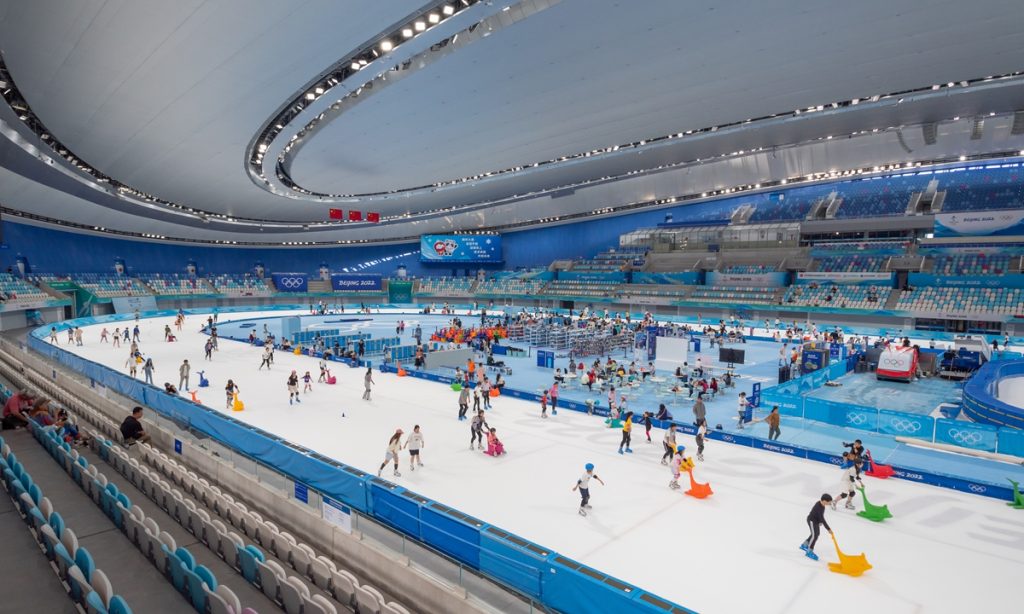Beijing welcomes international athletes as Olympic legacy continues

A series of international winter sports events will be held in Beijing in the upcoming weeks as the host city of the Beijing 2022 Winter Olympics continues to enjoy a stellar Olympic legacy.
As the 2023-24 ISU World Cup Speed Skating is scheduled to be held from November 17 to 19 at the National Speed Skating Oval, the city's competition venues for the Beijing 2022 Winter Games will once again welcome the world's elite athletes.
Li Yang, vice chief of China's winter sports governing body, said that the packed schedule for international winter sports events underlines a growing enthusiasm toward winter sports after the sensational Winter Olympics of 2022.
"The piling up of major competitions is a reflection of the utilization of the legacy of the Winter Olympics," Li told reporters at a news conference on November 14 ahead of the speed skating competition. "Winter sports have not lost their popularity since the Winter Olympics, but rather have become more popular."
The short track speed skating competition, a World Cup event under the International Skating Union, is set to be held at the Capital Indoor Stadium from December 8 to 10. It remains the most popular among the winter sports competitions set to be hosted in Beijing.
Tickets for the penultimate and ultimate days of the competition have been sold out since they were made available on November 13, according to Chen Jie, vice chief of the Beijing Municipal Bureau of Sports.
The reason for this popularity may lie in China's star-studded competition line-up squad, which features naturalized Olympic champions Lin Xiaojun, as well as brothers Liu Shaolin and Liu Shaoang.
The 'fastest ice'
The National Speed Skating Oval has been hailed as the "fastest ice" due to its state-of-the-art ice rink conditions. It witnessed three new world records during the 2022 Olympics.
The ice rink has been regenerated for the first time since the Olympics.
Gao Tingyu, an Olympic gold medalist in the men's 500-meter speed skating category, has returned to compete after a 21-month-long hiatus due to a waist injury.
"This home game is a test of training over the last six months for not only me, but also the whole speed skating team," Gao told reporters, stressing that "though I am not in my best form, I will still do my best on the 'fastest ice.'"
As it is only weeks before the New Year, the competition schedule has had to contend with timing conflicts. The speed skating races will be held concurrently with the bobsleigh and skeleton World Cup at the National Sliding Centre in Beijing's suburb Yanqing, while the Grand Prix of Figure Skating Final will clash with the popular short track World Cup race.
Shen Xue, a former Olympic figure skating champion and now head of China's figure skating governing body, was once an athlete who competed at the Grand Prix of Figure Skating Final held in Beijing in 2004. She admitted that the figure skating national squad is currently in a slump and needs more support.
"In competitive sports, peaks and slumps are intertwined. Currently, figure skating is at a low ebb, but as time passes, I believe we will be back at the top," Shen said.
Growing popularity
Hosting the Winter Olympics has not only ignited a passion for winter sports but has also left a lasting impact on the development of winter sports in China. Regions in southern parts of China, such as Chongqing and Shanghai, have already hosted skating competitions this year, exemplifying the concept of expanding winter sports from the traditional northern regions to the south.
Earlier this year, Harbin in the northeast won a bid to host the 2025 Asian Winter Games, which is expected to further fuel the popularity of winter sports in the region, and is considered to be the greenhouse of China's winter sports athletes. A new generation of athletes is emerging onto the scene, fuelled by the inspiration of witnessing the pinnacle of winter sports on home soil.
China has witnessed the involvement of 300 million people in ice and snow activities, resulting in a significant increase in participation in winter sports.
Domination by a younger demographic paves the way for broader talent development in China's winter sports, said Mao Jiale, a sports commentator based in Chengdu.
"Winter sports are no longer confined to the northern regions, as evidenced by the popularity of ice events in southern provinces," Mao told the Global Times. "The 300 million people committed to engaging in ice and snow activities have contributed to a surge in interest and participation, expanding the footprint of winter sports across the country."
Thanks to the growing popularity of winter sports, several southern provinces and regions, such as Sichuan, Chongqing, and Guangdong, have constituted their winter sports teams for the first time in history.
They are aiming to compete at the National Winter Games, which will be held in February 2024 in Hulun Buir in North China's Inner Mongolia Autonomous Region.
The number of winter sports participants is expected to grow further, according to Mao.
"Hosting the Winter Olympics is just the starting point of China's rise in winter sports," Mao said. "The massive attention to winter sports thanks to the Beijing Olympics has energized a wide fan base across the country. The popularity will surely grow in the years to come."